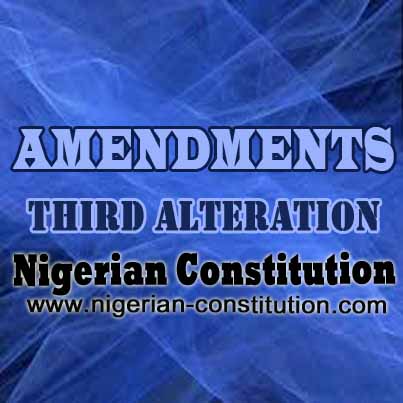ARRANGEMENT OF SECTIONS
| Section | Object | Section | Object |
| 1 | Alteration of Cap. C23 LFN, 2004 | 2 | Alteration of Section 6 of the Principal Act |
| 3 | Alteration of Section 84 of the Principal Act | 4 | Alteration of Section 240 of the Principal Act |
| 5 | Alteration of Section 243 of the Principal Act | 6 | Insertion of new Sections 254A _. 254F |
| 7 | Alteration of Section 287 of the Principal Act | 8 | Alteration of Section 289 of the Principal Act |
| 9 | Alteration of Section 292 of the Principal Act | 10 | Alteration of Section 294 of the Principal Act |
| 11 | Alteration of Section 295 of the Principal Act | 12 | Alteration of Section 316 of the Principal Act |
| 13 | Alteration of Section 318 of the Principal Act | 14 | Alteration of the Third Schedule to the Principal Act |
| 15 | Alteration of the Seventh Schedule to the Principal Act | 16 | Citation |
CITATION
An Act to alter the Constitution of the Federal Republic of Nigeria Cap. C.23, Laws of the Federation of Nigeria, 2004 for the establishment of the National Industrial Court under the Constitution
ENACTED by the National Assembly ofthe Federal Republic of Nigeria—
Alteration of Cap C23, Laws of the Federation, 2004
1. The Constitution of the Federal Republic of Nigeria Cap. C23, Laws of the Federation of Nigeria. 2004 (in this Act referred to as “the Principal Act”) is altered as set out under this Act.
Alteration of Section 6 of the Principal Act
2. Section 6 of the Principal Act is altered in subsection (5) by inserting immediately after the existing paragraph (c) a new paragraph “(ee)”-
“(cc) the National Industrial Court”
Alteration of Section 84 of the Principal Act
3. Section 84(4) of the Principal Act is altered by inserting immediately after the words “Judge of the Federal High Court” in line 4, the words “President of the National Industrial Court, Judge of the National Industrial Court”.
Alteration of Section 240 of the Principal Act
4. Section 240 of the Principal Act is altered by inserting immediately after the words “Federal High Court” in line 3. the words “the National Industrial Court”.
Alteration of section 243 of the Principal act
5. Section 243 of the Principal Act is altered by-
(a) inserting immediately after the words “Federal High Court” in the
marginal note, the words “National Industrial Court”; and
(b) inserting immediately after thc existing section 243, new subsections “(2) (4)”-
“(2) An appeal shall lie from the decision of the National Industrial Court as of right to the Court of Appeal on questions of fundamental rights as contained in Chapter IV of this Constitution as it relates to matters upon which the National Industrial Court has jurisdiction.
(3) An Appeal shall only lie from the decision of the National
Industrial Court to the Court of Appeal as may be prescribed by an Act of the National Assembly: Provided that where an Act or Law prescribes that an appeal shall lie from the decisions of the National Industrial Court to the Court of Appeal, such appeal shall be with the leave of the Court of Appeal.
(4) Without prejudice to the provisions of section 254C (5) of this Act the decision of the Court of Appeal in respect of any appeal arising from any civil jurisdiction of the National Industrial Court shall be final”; and
(c) renumbering section 243 as new section “243 (1)”. Chapter VIL Part I of the Principal Act is altered by inserting immediately after section 254 a new sub-heading “(cc)” and sections “254A – 254F”-
“CC- The National Industrial Court of Nigeria
254A- (I) There shall be a National Industrial Court of Nigeria.
(2) The National Industrial Court shall consist of:
(a) President of the National Industrial Court; and
(b) such number of Judges of the National Industrial Court as may be prescribed by an Act of the National Assembly.
254 B (1) The appointment of a person to the office of President of the National Industrial Court shall be made by the President on the recommendation of the National Judicial Council subject to confirmation of such appointment by the Senate.
(2) The appointment of a person to the office of a Judge of the National Industrial Court shall be made by the President on the recommendation of the National Judicial Council.
(3) A person shall not be eligible to hold the office of a President of the National Industrial Court unless the person is qualified to practice as a legal practitioner in Nigeria and has been so qualified for a period of not less than ten years and has considerable knowledge and experience in the law and practice of industrial relations and employment conditions in Nigeria.
(4) A person shall not be eligible to hold the office of a Judge of the National Industrial Court unless the person is a legal practitioner ill Nigeria and has been so qualified for a period of not less than ten years and has considerable knowledge and experience in the law and practice of industrial relations and employment conditions in Nigeria.
(5) If the office of the President of the National Industrial Court is vacant, or if the person holding the office is for any reason unable to perform the functions of the office, then, until a person has been appointed to and assumed the functions of that office or until the person holding the office has resumed those functions, the President shall appoint the most senior Judge of the Court having the qualification to be appointed as President of the National Industrial Court as provided under subsection (3) of this section to perform those functions.
(6) Except on the recommendation of the National Judicial Council, an appointment pursuant to the provisions of subsection (5) of this section shall cease to have effect after the expiration of three months from the date of such appointment and the President shall not reappoint a person whose appointment has lapsed.
Jurisdiction
254 C- (I) Notwithstanding the provisions of sections 251, 257, 272 and anything contained in this Constitution and in addition to such other jurisdiction as may be conferred upon it by an Act of the National Assembly, the National Industrial Court shall have and exercise jurisdiction to the exclusion of any other court in civil causes and matters-
(a) relating to or connected with any labour, employment, trade unions, industrial relations and matters arising from workplace, the conditions of service, including health, safety, welfare of labour, employee, worker and matters incidental thereto or connected therewith;
(b) relating to, connected with or arising from Factories Act, Trade Disputes Act, Trade Unions Act, Labour Act, Employees’ Compensation Act or any other Act or Law relating to labour, employment, industrial relations, workplace or any other enactment replacing the Acts or Laws;
(c) relating to or connected with the grant of any order restraining any person or body from taking part in any strike, lock-out or any industrial action, or any conduct in contemplation or in furtherance of a strike, lock-out or any industrial action and matters Connected therewith or related thereto;
(d) relating to or connected with any dispute over the interpretation and application of the provisions of Chapter IV of this Constitution as it relates to any employment, labour, industrial relations, trade unionism, employer’s association or any other matter which the Court has jurisdiction to hear and determine;
(e) relating to or connected with any dispute arising from national minimum wage for the Federation or any part thereof and matters connected therewith or arising there from;
(1) relating to or connected with unfair labour practice or international best practices in labour, employment and industrial relation matters;
(g) relating to or connected with any dispute arising from discrimination or sexual harassment at workplace;
(h) relating to, connected with or pertaining to the application or interpretation of international labour standards;
(i) connected with or related to child labour, child abuse, human trafficking or any matter connected therewith or related thereto;
(j) relating to the determination of any question as to the interpretation and application of any-
(i) collective agreement;
(ii) award or order made by an arbitral tribunal in respect of a trade dispute or a trade union dispute;
(iii) award or judgment of the Court;
(iv) term of settlement of any trade dispute;
(v) trade union dispute or employment dispute as may be recorded in a memorandum of settlement;
(vi) trade union constitution, the constitution of an association of employers or any association relating to employment, labour, industrial relations or work place;
(vii) dispute relating to or connected with any personnel matter arising from any free trade zone in the Federation or any part thereof;
(k) relating to or connected with disputes arising from payment or nonpayment of salaries, wages, pensions, gratuities, allowances, benefits and any other entitlement of any employee, worker, political or public office holder, judicial officer or any civil or public servant in any part of the Federation and matters incidental thereto;
(l) relating to-
(i) appeals from the decisions of the Registrar of Trade Unions, or matters relating thereto or connected therewith;
(ii) appeals from the decisions or recommendations of any administrative body or commission of enquiry, arising from or connected with employment, labour, trade unions or industrial relations; and
(iii) such other jurisdiction, civil or criminal and whether to the exclusion of any other court or not, as may be conferred upon it by an Act of the National Assembly;
(m) relating to or connected with the registration of collective agreements.
(2) Notwithstanding anything to the contrary in this Constitution, the
National Industrial Court shall have the jurisdiction and power to deal with any matter connected with or pertaining 10 the application of any international convention, treaty or protocol of which Nigeria has ratified relating to labour, employment, workplace, industrial relations or matters connected therewith.
(3) The National Industrial Court may establish an Alternative Dispute Resolutions Centre within the Court premises on matters which jurisdiction is conferred on the court by this Constitution or any Act or Law:
Provided that nothing in this subsection shall preclude the National Industrial Court from entertaining and exercising appellate and supervisory jurisdiction over an arbitral tribunal or commission, administrative body, or board of inquiry in respect of any matter that the National Industrial Court has jurisdiction to entertain or any other matter as may be prescribed by an Act of the National Assembly or any Law in force in any part of the Federation.
(4) The National Industrial Court shall have and exercise jurisdiction and powers to entertain any application for the enforcement of the award, decision, ruling or order made by any arbitral tribunal or commission, administrative body, or board of inquiry relating to, connected with, arising from or pertaining to any matter of which the National Industrial Court has the jurisdiction to entertain.
(5) The National Industrial Court shall have and exercise jurisdiction and powers in criminal causes and matters arising from any cause or matter of which jurisdiction is conferred on the National Industrial Court by this section or any other Act of the National Assembly or by any other law.
(6) Notwithstanding anything to the contrary in this Constitution, appeal shall lie from the decision of the National Industrial Court from matters in sub-section 5 of this section to the Court of Appeal as of right.
Powers
254D (1) For the purpose of exercising any jurisdiction conferred upon it by this Constitution or as may be conferred by an Act of the National Assembly, the National Industrial Court shall have all the powers of a High Court.
(2) Notwithstanding subsection (I) of this section, the National Assembly may by law, make provisions conferring upon the National Industrial Court powers additional to those conferred by this section as may appear necessary or desirable for enabling the Court to be more effective in exercising its jurisdiction.
Constitution of the Court
254 E (1) For the purpose or exercising any jurisdiction conferred upon it by this Constitution or any other law, the National Industrial Court shall be duly constituted if it consists of a single Judge or not more than three Judges as the President of the National Industrial Court may direct.
(2) For the purpose of exercising its criminal jurisdiction, the President of the Court may hear and determine or assign a single Judge of the Court to hear and determine such matter.
(3) For the purpose of exercising any jurisdiction conferred upon it by the Constitution or any other law, the Court may. if it thinks it expedient to do so or in a manner prescribed under any enactment, law or rules of court, call in the aid of one or more assessors specially qualified to try and hear the cause or matter wholly or partly with the assistance of such assessors.
(4) For the purpose of subsection(3) of this section, an assessor shall be a person who is qualified and experienced in his field of specialization and who has been so qualified for a period of not less than ten years.
254F (1) Subject to the provisions of any Act of the National Assembly, the President of the National Industrial Court may make rules for regulating the practice and procedure of the National Industrial Court.
(2) For the purpose of exercising its criminal jurisdiction, the provisions of the Criminal Code, Penal Code, Criminal Procedure Act, Criminal Procedure Code or Evidence Act shall apply”.
Alteration of section 287 of the Principal Act
7. Section 287(3) of the Principal Act is altered by inserting “the National industrial Court” immediately after, “the Federal High Court”, in lines 1 and 4 respectively.
Alteration of section 289 of the Principal Act
8. Section 289 of the Principal Act is altered by inserting immediately after the words “a Judge of the Federal High Court or” in line 2, the words “Judge of the National Industrial Court”.
Alteration of section 292 of the Principal Act
9. Section 292 of the Principal Act is altered in subsection (1)(a)(i), line 2, by inserting immediately after the words “Federal High Court” the words, “President of the National Industrial Court”.
Alteration of section 294 of the Principal Act
10. Section 294(4) of the Principal Act is altered by inserting immediately after the word “Appeal” in line 2, the words “or the National Industrial Court”.
Alteration of section 295 of the Principal Act
11. Section 295 of the Principal Act is altered-
(a) in subsection (I), by inserting immediately alter the word “or” in lines 4 and 7, the words, “the National Industrial Court”;
(b) in subsection (I )(b), by inserting immediately after the word “or” in line 3, the words, “National Industrial Court or”; and
(c) in subsection (2). by inserting immediately after the word “or” in line 2, the words, “National Industrial Court or”,
Alteration of Section 316 of the Principal Act
12. Section 316 or the Principal Act is altered by inserting a new subsection “(5)” after the existing subsection (4)-
“(5) Notwithstanding the provisions of this section the National Industrial Court Act 2006 and any office or authority established and charged with any function under the Act, shall be deemed to have been duly established and shall continue to be charged with such function by virtue of this Constitution or in accordance with the provision of a law made thereunder”,
Alteration of Section 318 of the Principal Act
13. Section 318 of the Principal Act is altered by inserting the words-
(a) “the office or the President or Judge of the National Industrial Court” immediately alter the words “Federal High Court” in line 3 under the interpretation of Judicial Office; and
(b) “the National Industrial Court” immediately after the words “the Federal High Court” in paragraph (b), line 1 under the interpretation of “Public Service of the Federation”,
Alteration to the Third Schedule to the Principal Act
14. The Third Schedule to the Principal Act is altered-
(a) in paragraph 12, by inserting immediately after paragraph (d), a new paragraph “( dd)”-
“(dd)” the President of the National Industrial Court”;
(b) in paragraph 13(a), by inserting new subparagraphs “(via)” and “(vib)” immediately after the existing subparagraph (vi)-
“(via) the President of the National Industrial Court”; and
“(vib) a Judge of the National Industrial Court, and”;
(c) in paragraph 13(c), by inserting immediately after the word “Court”, in
line 3, the words “the National Industrial Court”;
(d) in paragraph 20, by inserting immediately alter subparagraph (e), a new subparagraph “(ee)-
“(ee)” “The President of the National Industrial Court”; and
(e) in paragraph 21(a)(i), by inserting immediately after the words “Federal High Court” in line 4, the words “the President and Judges of the National Industrial Court”.
Alteration of the Seventh Schedule to the Principal Act
The Seventh Schedule to the Principal Act is altered by inserting immediately after the words “Federal High Court” in line 4 under “Judicial Oath”, the words “President/Judge of the National Industrial Court”.
Citation
This Act may be cited as the Constitution (Third Alteration) Act, 2010
| Short Title of the Bill | Long title of the Bill | Summary of the content of bill | Date passed by the Senate | Date passed by the House of Representatives | Date of Receipt of approval by the State Houses of Assembly |
| Constitution of the Federal Republic of Nigeria (Third Alteration) Bill 2010 | An Act to alter the | The Bill seeks to further alter the Constitution of the Federal Republic of Nigeria for the Establishment of the National Industrial Court under the Constitution | 14th December, 2010 | 15th December, 2010 | 8th February, 2011 |






